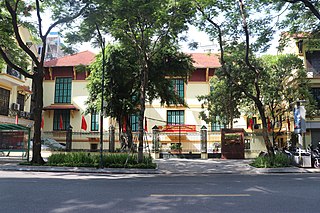
Telecommunications in Cambodia include telephone, radio, television, and Internet services, which are regulated by the Ministry of Posts and Telecommunications. Transport and posts were restored throughout most of the country in the early 1980s during the People's Republic of Kampuchea regime after being disrupted under Democratic Kampuchea.
Modern telecommunications in Thailand began in 1875 with the deployment of the first telegraph service. Historically, the development of telecommunication networks in Thailand were in the hands of the public sector. Government organisations were established to provide telegraph, telephone, radio, and television services, and other government agencies, especially the military, still control a large estate of radio and television spectra. Private telecommunication operators initially acquired concession agreements with state enterprises. For mobile phone services, all the concessions have been amended by successive government to last 25 years have gradually ended in 2015. For other services, the concession terms and conditions vary, ranging from one to fifteen years. Nearly all of the concessions are build-operate-transfer (BTO) contracts. The private investor has to build all the required facilities and transfer them to the state before they can operate or offer services to public.
Communications in Vietnam include the use of telephones, radio, television and Internet.
Skyworth, officially Skyworth Group Co., Ltd., is a Chinese holding company. Its subsidiaries design, manufacture and sell televisions and other audio-visual products. They also invest in properties. Headquartered in Nanshan High-tech Park, Shenzhen, as of 2010, Skyworth has operations in Hong Kong and Inner Mongolia as well as in various locations in Guangdong including Shenzhen, Guangzhou, and Dongguan.

Ho Chi Minh Stock Exchange, formerly the HCMC Securities Trading Center (HoSTC), is a stock exchange in Ho Chi Minh City, Vietnam. It was established in 1998 under Decision No. 127/1998/QD-TTg of the Prime Minister of Vietnam. HCM Securities Trading Center officially opened on July 20, 2000, and had its first trading session on July 28, 2000, with two listed companies and six security company members.
The telecommunications industry in China is dominated by three state-run businesses: China Telecom, China Unicom and China Mobile. The three companies were formed by restructuring launched in May 2008, directed by the Ministry of Information Industry (MII), National Development and Reform Commission (NDRC) and the Minister of Finance. Since then, all three companies gained nationwide fixed-line and cellular mobile telecom licenses in China. In 2019, all three telecoms were issued 5G national licenses.

Chunghwa Telecom Company, Ltd. is the largest integrated telecom service provider in Taiwan, and the incumbent local exchange carrier of PSTN, Mobile, and broadband services in the country.

Television in Vietnam began to appear in the mid-1960s in Saigon, with the appearance of Saigon Television Station. In 1970, in the North, Voice of Vietnam broadcast the first test television program. In the late 1970s, color television was introduced and broadcast experimentally. Today, television in Vietnam is available in many modes of broadcasting, with many national and local channels, broadcast or pay with more than 200 channels available to viewers. Vietnam completed the digital television transitions on December 28, 2020.

The Voice of Vietnam is the Vietnamese national radio broadcaster. Directly controlled by the government of Vietnam, it is tasked propagating the policies of the Party and the laws of the state.
DTMB is the digital TV standard for mobile and fixed devices, developed in the People's Republic of China. It is used there and in both of their special administrative regions, and also in Cambodia, the Comoros, Cuba, East Timor, Laos, Vietnam, and Pakistan. In Pakistan, as part of the China–Pakistan Economic Corridor Project, ZTE Corporation will provide Pakistan Television Corporation collaboration across several digital terrestrial television technologies, staff training, and content creation, including partnerships with Chinese multinational companies in multiple areas, such as television sets and set top boxes, as a form of "International Cooperation".

The University of Information Technology, or VNU-HCM University of Information Technology, is a public university located in Ho Chi Minh City, Vietnam, a member of Vietnam National University, Ho Chi Minh City. Although its name is about information technology, this university teaches many computer studies. The first course was inaugurated on 6 November 2006.

VNG Corporation, also recognized by its former brand name VinaGame (VNG), is a Vietnamese-founded technology company that was founded in the year 2004. It specialises in digital content, online entertainment, social networking, and e-commerce. It focuses on four main businesses, including online games, platforms, digital payments, and cloud services. VNG were responsible for the development of products such as Zalo, ZaloPay, Zing MP3, and 123phim and dead games.
The Communications Authority of Kenya (CA) is the regulatory agency for the ICT industry in Kenya with responsibilities in telecommunications, e-commerce, broadcasting and postal/courier services. The CA is also responsible for managing the country's numbering and frequency spectrum resources, administering the Universal Service Fund (USF) as well as safeguarding the interests of users of ICT services.

The Military Industry and Telecoms Group, doing business as Viettel or Viettel Group, is a Vietnamese state-own multinational telecommunications, technology and manufacturing conglomerate headquartered in Hanoi, Vietnam. The enterprise is run by the Vietnam Ministry of National Defence, making it a military-associated corporation.
Hung Yen University of Technology and Education is a government-funded university in Hưng Yên Province, Vietnam.

13/9/1993: National Atomic Energy Commission was renamed Vietnam Atomic Energy Institute under the Ministry of Science, Technology and Environment (According to Decree No. 59/CP dated September 13th, 1993 of the Government)
The use of new media in Ghana like elsewhere is growing. The Information and Communications Technologies (ICT) sector, which is based on a free market approach, has promoted new media use. Most popular aspects of new media to Ghanaians is the Internet, and its associated mobile and desktop applications for education, health, politics, business, publishing, governance and so on. Also popular is the use of mobile devices like smartphones and tablets and computers.
ABS-CBN Convergence, Inc. is the communications subsidiary of the media conglomerate ABS-CBN. It operates a wireless mobile phone service ABS-CBN Mobile, which was launched on November 16, 2013, and digital terrestrial television service ABS-CBN TV Plus, launched on February 11, 2015.
The VTC Digital Television Network, also known as VTC Digital Television or Vietnam Digital Television Network is the Vietnamese television network currently owned by Radio the Voice of Vietnam (VOV). Launched on 19 August 2004, it is the second national television network in Vietnam, and the first television provider to broadcast via digital terrestrial network.










